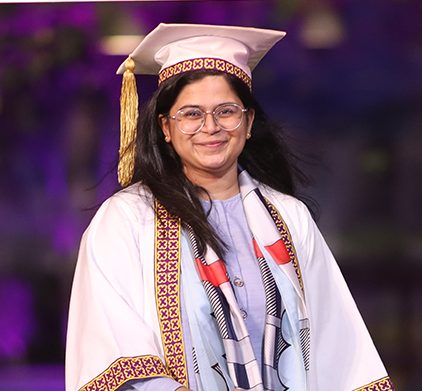
SYEDA ARMEEN NASIM
Aspiration Statement
I am aspiring to work with the education sector, including fields like institutional research, EdTech and career development. Also aspiring for graduate studies in South Asian studies, history, literature, linguistics, postcolonial studies, or international relations.
Core Skills
- MS Office
- Research
- Design Thinking
- Qualitative Research
- Project Management
- Design Research
Academic Awards / Achievements
- Universitat Autònoma de Barcelona - Master's degree in Education Policy
- Dean's List 2018
- Dean's List Fall 2020
- American University, Washington D.C.
- Erasmus Mundus Scholar 2022-24 | European Union
Experience
Leadership / Meta-curricular
- Habib University’s ‘Aaraish-e-Khayal’ Urdu Literary Club - President
- Sindh Institute of Urology and Transplantation (SIUT) - Volunteer
- The Kiran Foundation - Volunteer
Internship / Volunteer Work
- Friedrich Naumann Foundation for Freedom - Content Developer
- Habib University - Academic Advisor
- Institute of Business Administration - Research Associate Qualitative UNDP Project
- The Foundry - Design Researcher
- IDEATE Innovation - Design Fellow
- National Rural Support Program - Research Intern
- Playground: Transcdisciplinary Design & Innovation Lab | Habib University - Design Researcher
- Marvi Mazhar And Associates - Research Intern
Final Year Project
Project Title
The Question of Marriage Between Tradition and Law: Do Pakistani Women Have a Choice?
Description
Marriage is an essential institution in Pakistan and is considered an important moral and social obligation. The choice made in marriage is a critical determinant of women's adult lives so that laws and customs governing marriage are of vital importance to their overall well-being (Critelli, 2012). This paper explores the evolution of the Muslim Personal Law, and subsequent reforms made to it. It analyzes the position of women within the socio-legal frameworks that govern and dictate the norms of Pakistani society. For this purpose, the paper takes into account an extensive survey of literature to understand how the institution of marriage replicates itself across times and within this framework, what choices does it offer to the women. It critically analyzes the legal document that guards the institution of marriage, the Nikkah Nama and attempts to discuss the question of divorce. In between, it tries to understand the intersecting role of traditional authority and state mandated laws: do women have the choice to choose their better half? If so, then to what extent? If not, then why? Lastly, what happens, when you disturb the status quo?